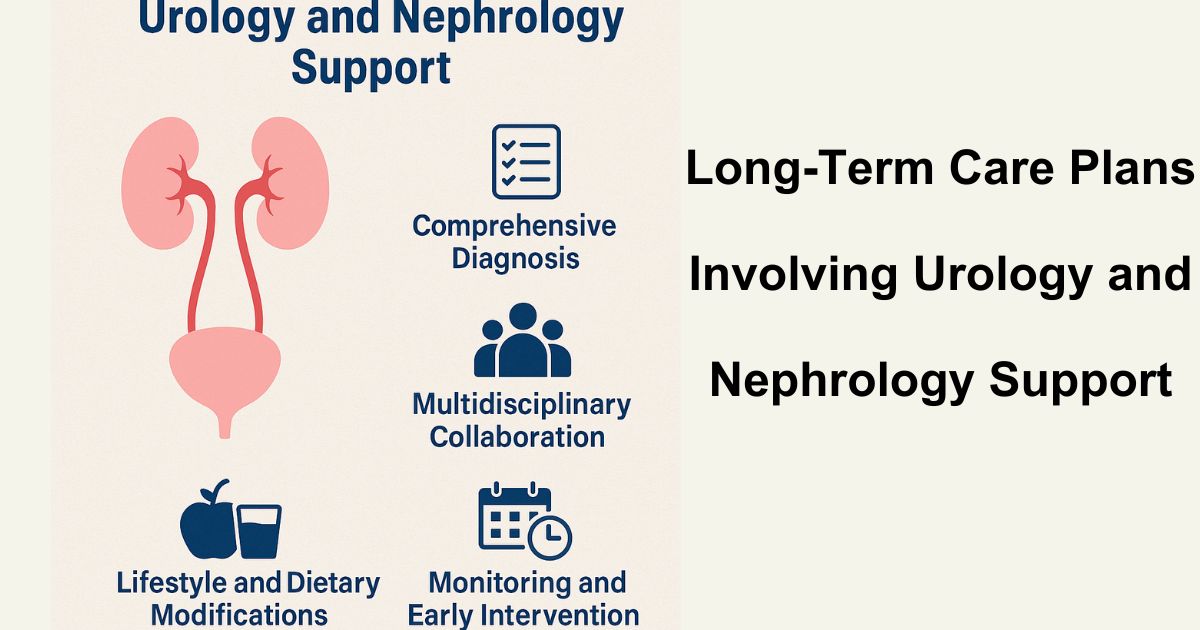When dealing with chronic health issues related to the urinary system or kidneys, patients often require long-term care plans that combine the expertise of both urology and nephrology. These two specialties, while distinct, frequently work hand-in-hand to manage conditions like chronic kidney disease (CKD), urinary incontinence, kidney stones, and other complications. Access to specialists such as a Urologist In Chennai or a Nephrologist In Chennai becomes essential in developing comprehensive and sustainable treatment strategies.
Understanding Urology and Nephrology
Before discussing long-term care, it’s important to distinguish between urology and nephrology. Urology is a surgical specialty that deals with diseases of the urinary tract and male reproductive organs. Urologists manage conditions such as bladder dysfunction, prostate enlargement, urinary tract infections (UTIs), and cancers of the urinary system.
On the other hand, nephrology is a medical specialty that focuses on the diagnosis and treatment of kidney diseases. Nephrologists handle systemic issues like chronic kidney disease, glomerulonephritis, and end-stage renal failure, often guiding patients through dialysis or preparing them for kidney transplants.
Why Long-Term Planning Is Crucial
Chronic urinary and kidney conditions often progress gradually. Without a structured care plan, these conditions may lead to complications such as kidney failure, recurrent infections, or severe urological dysfunction. A long-term care plan ensures consistent monitoring, timely intervention, and coordinated management between specialties.
In elderly patients or those with diabetes and hypertension—common risk factors for both urological and nephrological disorders—early detection and continuous care are even more vital.
Key Components of a Long-Term Care Plan
1. Comprehensive Diagnosis
The first step in developing a care plan is establishing a clear diagnosis. This usually involves a combination of blood tests, urine analysis, imaging studies, and sometimes biopsies. Urologists may use tools like cystoscopy or urodynamic testing, while nephrologists rely on lab-based monitoring of creatinine, GFR (glomerular filtration rate), and electrolyte levels.
2. Multidisciplinary Collaboration
For many patients, an integrated approach combining urology and nephrology ensures the best outcomes. For example, a patient with obstructive uropathy causing kidney damage needs surgical intervention from a urologist and long-term renal function management from a nephrologist. Regular collaboration and communication between the two specialists create a seamless treatment experience.
3. Lifestyle and Dietary Modifications
A vital aspect of long-term care is educating patients on lifestyle adjustments. Sodium and protein intake, hydration, and the management of blood pressure and blood sugar levels play a crucial role in preserving kidney and urinary tract health. Dietitians often work alongside nephrologists to craft renal-friendly diets, especially in patients with declining kidney function.
4. Medical Management
Chronic conditions require ongoing medication and monitoring. Patients with overactive bladder, for instance, may be on anticholinergic medications under a urologist’s care. Those with CKD may need antihypertensives, phosphate binders, and erythropoiesis-stimulating agents, monitored closely by nephrologists. Medication reviews are essential to prevent nephrotoxicity and to adjust dosages based on changing kidney function.
5. Monitoring and Early Intervention
Routine follow-ups allow for early detection of complications. Blood pressure readings, kidney function tests, urinalysis, and imaging scans should be part of regular evaluations. Early intervention can prevent hospitalizations, slow disease progression, and maintain a better quality of life for patients.
Common Conditions Requiring Long-Term Support
Chronic Kidney Disease (CKD)
CKD is one of the most common reasons for nephrology referral. It requires regular lab tests, strict blood pressure control, and monitoring for complications like anemia and bone disease. Urological evaluations may be needed if there’s underlying obstruction, recurrent infections, or urological causes of kidney damage.
Urinary Incontinence and Retention
These conditions, often seen in older adults, require lifestyle changes, medication, and sometimes surgical interventions. Long-term urological follow-up ensures symptom control and prevents complications like UTIs or kidney damage due to poor bladder emptying.
Kidney Stones
While some kidney stones can be managed acutely, recurrent stones necessitate long-term care. Urologists manage stone removal and prevention through hydration guidance and dietary modification. Nephrologists assess metabolic causes and monitor renal health, especially if the stones cause obstructions or infections.
Polycystic Kidney Disease (PKD)
PKD is a genetic disorder that progressively impairs kidney function. It requires ongoing nephrology care to monitor renal function and control blood pressure. In some cases, urologists manage complications like cyst infections or bleeding.
Role of Dialysis and Transplant Preparation
As kidney disease progresses to end-stage renal disease (ESRD), patients may need dialysis or a transplant. Nephrologists lead this phase of care by determining the right time to initiate dialysis, managing dialysis-related complications, and coordinating with transplant surgeons.
Urologists may be involved in preparing for dialysis access or addressing urological issues that complicate transplant readiness, such as bladder dysfunction. Comprehensive planning helps reduce hospitalizations and improves patient outcomes.
Home-Based and Palliative Support
Long-term urology and nephrology care isn’t limited to hospitals or clinics. Home-based programs for catheter care, peritoneal dialysis, or palliative management for terminal kidney disease are essential aspects of modern care planning. These services offer patient comfort, reduce hospital dependency, and allow personalized care at the patient’s convenience.
Technology in Long-Term Management
Digital health tools are transforming long-term care. Remote monitoring apps, electronic health records, and telemedicine platforms allow patients to stay in touch with their specialists. Blood pressure logs, urine outputs, and lab results can be shared instantly, allowing for timely interventions and better coordination between the urologist and nephrologist.
Conclusion
The integration of urology and nephrology in long-term care planning ensures holistic, patient-centered management for individuals with chronic urinary or kidney conditions. From diagnosis to home care, the collaborative effort between these specialties results in improved outcomes, enhanced quality of life, and reduced complications. Whether it’s finding a skilled Urologist In Chennai for surgical concerns or consulting a Nephrologist In Chennai for ongoing kidney care, timely and coordinated interventions make all the difference in a patient’s health journey.









